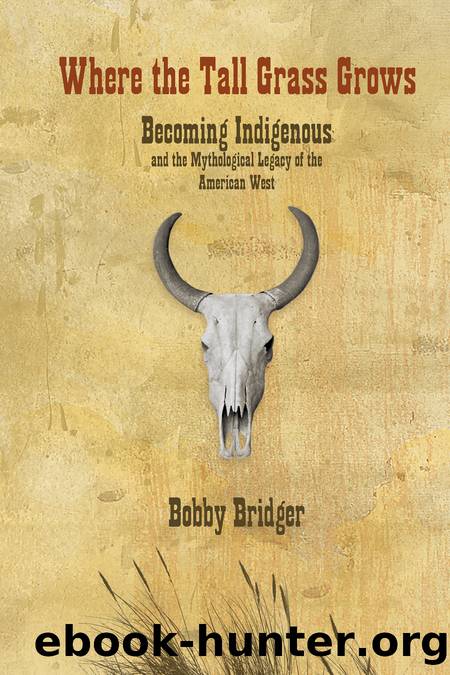Where the Tall Grass Grows by Bobby Bridger

Author:Bobby Bridger
Language: eng
Format: epub
Publisher: Fulcrum Publishing
Published: 2011-09-09T00:00:00+00:00
Chapter Twelve
A Clarion Call for Heroes
This is a good day to die. Think of the helpless ones at home! Then we all cried âHoka Hey!â1
âBlack Elk
The Japanese attack on Pearl Harbor on Sunday, December 7, 1941, was instantly followed by an unprecedented surge of Americans rallying to defend their country. This was especially the case in California, where everyone feared the attack in Hawaii was only the beginning of an imminent Japanese invasion of Americaâs West Coast. By mid-December fierce patriotism replaced preliminary invasion panic, and the film industry rapidly responded to Americaâs urgent call for volunteers. Top Hollywood actors Gene Autry, Henry Fonda, Clark Gable, Sterling Hayden, William Holden, Burgess Meredith, Robert Montgomery, Tyrone Power, Jimmy Stewart, Ronald Reagan, and Gilbert Roland joined with famous producers Harold Roach, Jack Warner, Darryl Zanuck, renowned directors John Ford, Frank Capra, John Huston, William Keighley, and William Wyler, noted screenwriters Garson Kanin and Budd Schulberg, and scores of cameramen, technicians, stagehands, and other members of the film industry who eventually enlisted in the military. Randy Roberts and James S. Olson note: âBy October 1942 more than 2,700 peopleâor 12 percentâof the men and women in the film industry had entered the armed forces. Some like Fonda and Stewart enlisted quietly and without fanfare. Others, like Reagan, Zanuck, and Gable, made the process of enlistment and service an act of public theater. But they all served.â2
Washington immediately took control of the steel and automotive industries as well as any other business interests vital to American security, and President Franklin D. Rooseveltâs advisors urged him to also take control of the film industry. But the president believed the film industry would function better if the studio heads remained in charge of operations. Only weeks after December 7, Roosevelt remarked, âThe American motion picture is one of our most effective media in informing and entertaining our citizens. The motion picture must remain free in so far as national security will permit.â Hollywood moguls interpreted the commander in chiefâs remarks to mean that the government was going to allow them to continue to make money if they combined entertainment with propaganda dedicated to serving the war effort.3
Since the inception of the motion picture industry, Americaâs extreme right had spit venom accusing Hollywood of being a bed of Communists controlled by immigrant Jews. Consequently, most of the Jewish studio heads in Hollywood walked on eggshells as Hitler and the Nazis rose in power in Europe. Even before the war officially began, Jewish producers like Samuel Goldwyn had joined with humanitarian aid groups to raise millions of dollars in relief funds for European refugees. War, however, was ironically âpeaceâ for Hollywoodâs Jewish film moguls; once the United States entered the conflict in Europe as well as the Pacific, Washington finally acknowledged and sanctified the sentimental Americana message immigrant Jewish producers such as Goldwyn, Zukor, and Louis B. Mayer had been encoding in their films since the genesis of the industry in a sincere effort to shed their âoutsiderâ status.
Download
This site does not store any files on its server. We only index and link to content provided by other sites. Please contact the content providers to delete copyright contents if any and email us, we'll remove relevant links or contents immediately.
Cecilia; Or, Memoirs of an Heiress — Volume 1 by Fanny Burney(32538)
Cecilia; Or, Memoirs of an Heiress — Volume 2 by Fanny Burney(31936)
Cecilia; Or, Memoirs of an Heiress — Volume 3 by Fanny Burney(31925)
The Great Music City by Andrea Baker(31912)
We're Going to Need More Wine by Gabrielle Union(19032)
All the Missing Girls by Megan Miranda(15927)
Pimp by Iceberg Slim(14477)
Bombshells: Glamour Girls of a Lifetime by Sullivan Steve(14046)
For the Love of Europe by Rick Steves(13875)
Talking to Strangers by Malcolm Gladwell(13342)
Norse Mythology by Gaiman Neil(13334)
Fifty Shades Freed by E L James(13229)
Mindhunter: Inside the FBI's Elite Serial Crime Unit by John E. Douglas & Mark Olshaker(9313)
Crazy Rich Asians by Kevin Kwan(9271)
The Lost Art of Listening by Michael P. Nichols(7487)
Enlightenment Now: The Case for Reason, Science, Humanism, and Progress by Steven Pinker(7303)
The Four Agreements by Don Miguel Ruiz(6741)
Bad Blood by John Carreyrou(6610)
Weapons of Math Destruction by Cathy O'Neil(6261)
